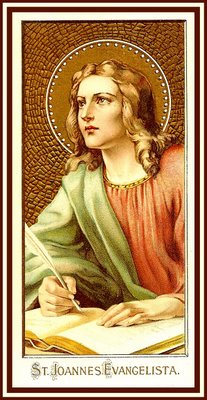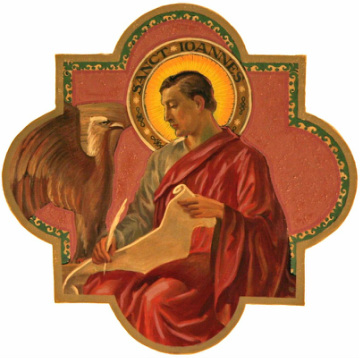
YOUNGEST of all the Apostles was he whom we know as the "Beloved Disciple," he who was permitted to rest his head upon the Sacred Heart throbbing with love for men, and afterwards to make that Divine love his constant theme.
John was the brother of James whom Herod Agrippa had put to death, and therefore the son of Zebedee and Salome. From his earliest years he had doubtless heard of the time when the long-foretold Messiah should be given to Israel, and thus when John Baptist came to preach penance and to prepare the way for his Master, John, after wards the Evangelist, enrolled himself among the Saint's disciples, and was directed by him to Jesus by the words," Behold the Lamb of God." From that hour, St. John became a follower of Christ, and his love was so deep and strong and true that be was admitted to great and particular favour by Our Lord.
With Sts. James and Peter, John was suffered to be present at the miracle of the raising of the young daughter of Jairus; they too were permitted to attend their Master to the Mount of Transfiguration and to go with Him in the first hour of His bitter Passion to the sorrowful Garden of Gethsemane. Truly John fled in the moment when the soldiers came to seize upon Jesus—fled because overcome by a great and sudden fear; but love soon conquered, and he returned to the hall of judgment to be near his Lord during His trial, and with aching agonized heart beheld the Crucifixion, and received the last earthly wish of that beloved Master, and took the Virgin Mother to his own home.
During the remaining fifteen years of Mary's life on earth, John remained with her in Jerusalem, but after she had been assumed to heaven he made his way to Asia, there to preach the Gospel of Christ and to confirm those who had already received the truth. The churches of Pergamos, of Smyrna, of Sardis, and others, were founded by St. John; but his chief residence was at Ephesus, which church he governed.
During the reign of the Emperor Domitian, a great persecution was raised against Christians, and by his order the Apostle was sent for and carried to the gate of Rome called Latina, where he was cast into a cauldron of boiling oil. Doubtless St. John offered his life gladly to God in that moment; yet the Will of the Almighty was not to accept him among the company of martyrs, but to prevent the fiery bath from causing him either pain or injury, so that he came forth from it refreshed as if it had been clear pure water.
Domitian's disappointment and rage were great, and believing this miracle had been effected by the power of magic, of which men spoke and thought so much in those days, he banished the aged Apostle to the desolate isle of Patmos in the Aegean sea. It was a bleak and barren spot, and thus chosen by the Emperors of Borne as especially suited for the residence of criminals, there being no chance of escape and no possibility of aid being rendered to them.
Away from all who could comfort him, Domitian deemed his punishment the most severe which he could inflict upon the Apostle, short of positive death; but his power could not shut heaven from the captive's sight, and God granted to St. John glorious visions of that "Jerusalem the Golden" which he mystically describes in the Apocalypse or Book of Revelations.
In this book, the glory of gold and the radiance of rare gems are employed to figure to us the splendour of heaven, still even the most learned of men must fail to comprehend what is reserved for us in that bright home; we only know and love to think that there is perfect peace, perfect joy, for no sorrow and no care can enter in, neither shall there be any more sin—it will be holiness, light, love, and "Christ all and in all!" At length Domitian died and was succeeded by Nerva, under whose milder rule St. John was allowed to leave Patmos for Ephesus, in which city he wrote his Gospel.
This Gospel abounds not so much in narrative as in doctrine, the design and work of Christ being specially dwelt upon. The reason for this seems to lie in the fact that certain heresies prevailed in those early days when men were beginning openly to deny the Divinity of Our Lord—an error which St. John sought to counteract. He also supplies some passages of Evangelical history which had been omitted by the other Evangelists.
St. John was the only one of the Apostles who did not die a martyr's death—it was the Will of God that he should remain a "living example of holiness unto all men," to the great age of nearly a hundred years. Three Epistles come to us from the hand of the Beloved Disciple.
In the first of these he addresses Christians generally, telling them that in Jesus we have eternal life and fellowship with the Father, but that holiness of life must be the fruit of this faith, for "If we say that we have fellowship with Him and walk in darkness, we lie, and do not the truth." He goes on to preach the forgiveness of sins, and to insist upon fraternal charity as the proof of love to God; he also warns us not to give ear to false teachers who are not led by the Spirit of God.
The second Epistle of St. John was written for the purpose of encouraging a Christian matron with her children to walk perseveringly in the way of truth, and to avoid any dealings with those who taught not the true doctrine of Christ Jesus.
The third Epistle is addressed to one called Gaius, of whose good and charitable deeds the Apostle had heard with joy. It seemed the especial work of St. John to teach the grand, yet simple lesson of Divine love, and that love to all men which must spring from the heart which is indeed penetrated with this love of God. "If God so loved us, we ought also to love one another;" thus did he write for us of later times as well as for those who heard the message also from his holy lips.
Tradition tells us a beautiful story of St. John's last days on earth. Feeling that his time was short, and being so weak that he could no longer walk to the church where he had been accustomed to teach, the old Apostle entreated his friends to bear him in their arms so that he might once more speak of Christ. They did what he desired; but when he looked round upon the assembly his strength failed him, the words he longed to utter died upon his feeble tongue, he could only raise his trembling hands in a last blessing and falter, "Little children, love one another, love one Another!"
Among the other cruelties which the Emperor Domitian practiced upon the holy Apostle John, was the sending him a poisoned cup. But the Saint, taking it in his hand, made the sacred sign of the Cross, at which a serpent sprang from it, and, without doing harm to any one, glided away. This cup is preserved at Rome, in the church of St. John Lateran, as well as the tunic of the Apostle, and a piece of the chain with which he was bound on the journey from Ephesus to Rome.
A singular devotion has been entertained for St. John by many of the Saints. Among these is St. Edward the Confessor, of whom we read that he never refused anything asked in the name of the Apostle. On one occasion St. John himself appeared in a beggar's dress beseeching alms, and the pious king, having no money with him, took the ring from his finger and gave it to the beggar. It was returned to him afterwards by St. John, with the tidings of his death upon a certain day, which prediction was fulfilled.
To both St. Bridget of Sweden and St. Gertrude, the Apostle appeared several times in vision, and when the last-named Saint asked; God to reveal to her how she could show her love and gratitude to His beloved disciple, the answer was this: "If any one will say an 'Our Father' daily in honour of this Apostle, reminding him of the faithfulness which filled his heart when he learnt this prayer from My lips, he will surely obtain for such an one the gift of persevering in sanctifying grace to the end of his life."
There is an oft-told legend of St. John's life, which we cannot omit here, because it shows so clearly his love for souls and his tenderness to sinners. After his sojourn at Patmos, the Apostle met in a certain city with a youth whom he persuaded to begin to walk in the way of eternal life. Being compelled to go elsewhere, St. John entrusted this youth to the care of the Bishop, calling upon Our Lord to witness his charge solemnly given in the church of the city. The Bishop promised to guide and watch over the young man, and did indeed baptize him and instruct him carefully in Christian doctrine but he allowed him to go from his care too soon, so that, borne down by strong temptation, he fell into many and grievous sins. One night he went with his bad companions to take part in a highway robbery, and the desire for gain took such hold of his mind that he became one of the chief robbers and assassins in those parts. Time passed, and St. John, returning to the city, sought the Bishop and said: "Give me back him whom I committed to your charge in the presence of Christ Jesus." "He is dead," said the Bishop, "Dead to God, for he has become a robber upon the highway."
The Apostle's heart was pierced with grief at such tidings, and calling for a horse he rode quickly towards the mountain where his pupil was then known to dwell. The robbers, however, employed sentinels to guard the mountain passes, and these seized upon St. John and carried him before their leader.
He, the once promising youth—recognized his spiritual Father, and, for very shame, turned and fled. But the old Apostle would not thus let him go, and following him cried: "Why art thou flying from thy Father? stay, my son, for Jesus has sent me to you." The young robber paused at these words, sorrow now succeeded to shame, and he began to weep bitterly; yet he would not stretch out his hand, defiled as it was with crime, to touch the Saint.
But he, the Saint of love took that sinful hand and touched it with his lips, then he led away the youth to the church, nor was it long before his soul was restored to life, and he regained all the grace he had lost. Thus did John love sinners, because great, and deep, and burning was his love for Him Who died for sinners, and Who came into the world to seek and to save the lost.
Source: Lives of the Saints, Vol. IV, 1878
Collect from the Mass of St. John
Mercifully, O Lord, enlighten thy Church: that being taught by blessed John, thine Apostle and Evangelist, she may come to thy eternal rewards. Through Our Lord Jesus Christ, thy Son, Who liveth and reigneth with Thee in unity with the Holy Ghost, world without end. Amen.
Source: The Liturgical Year, 1867
A couple coloring pictures for the children can be found below:
|
| ||||



 RSS Feed
RSS Feed